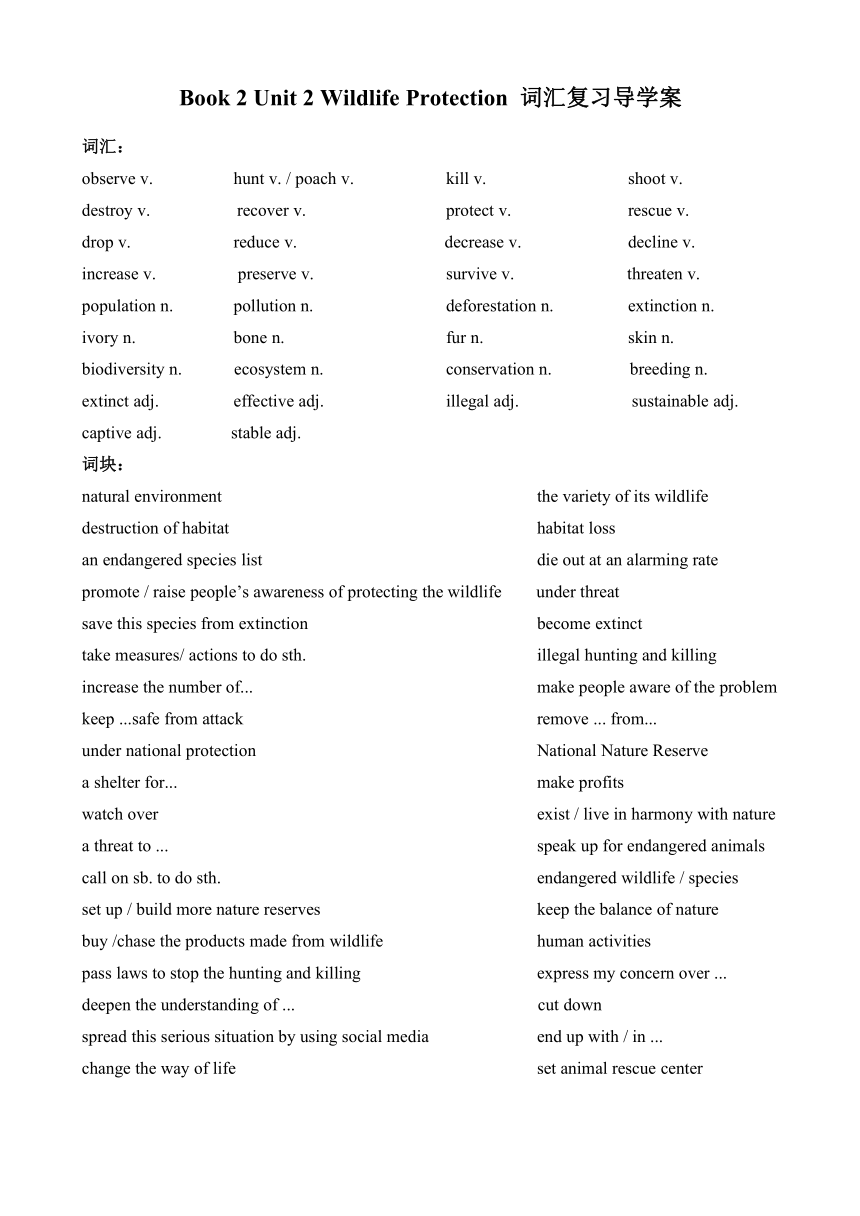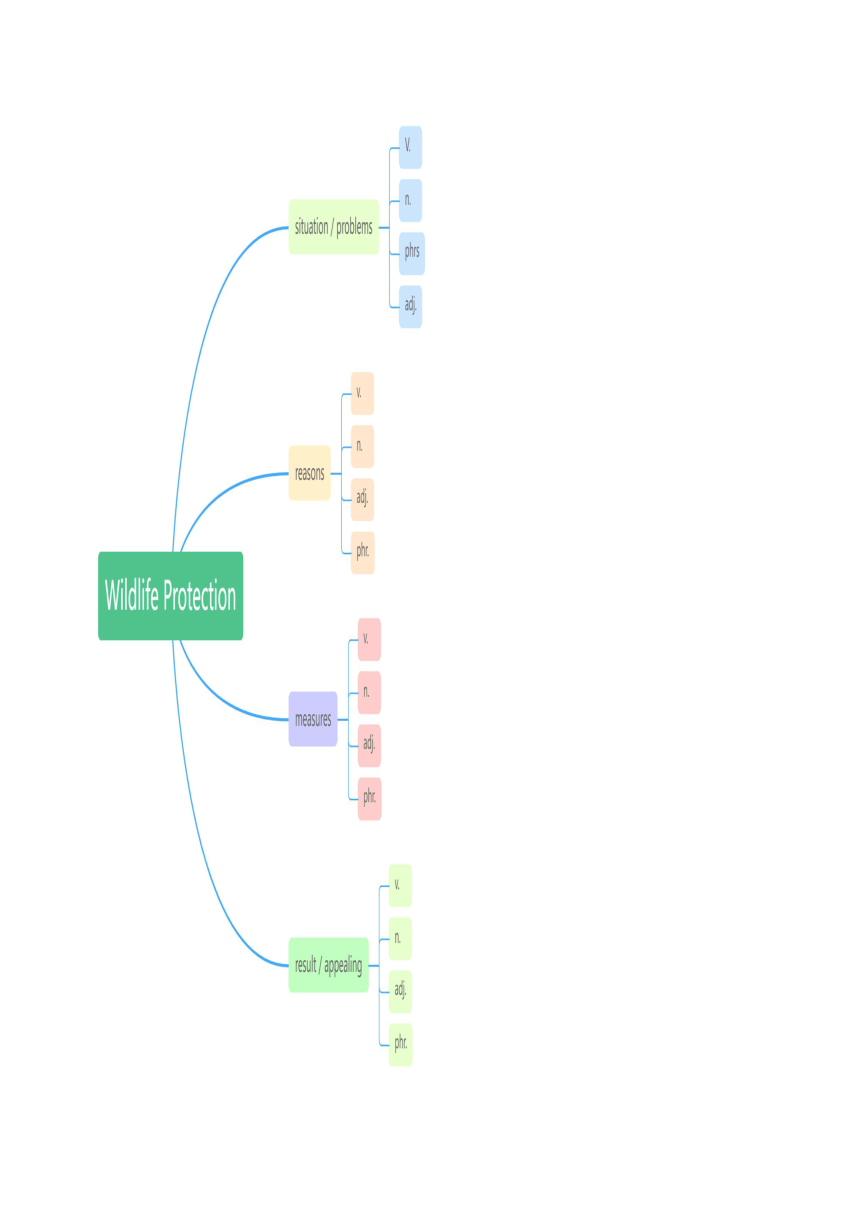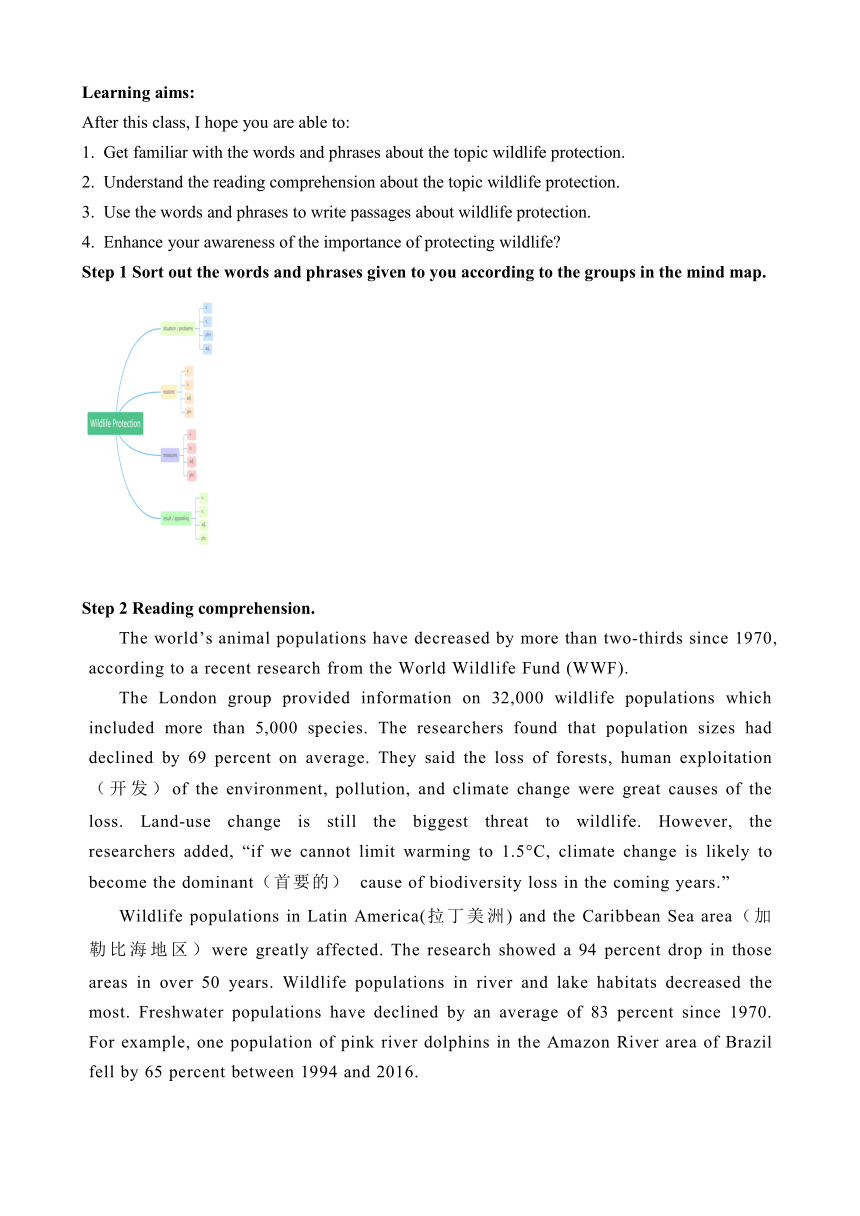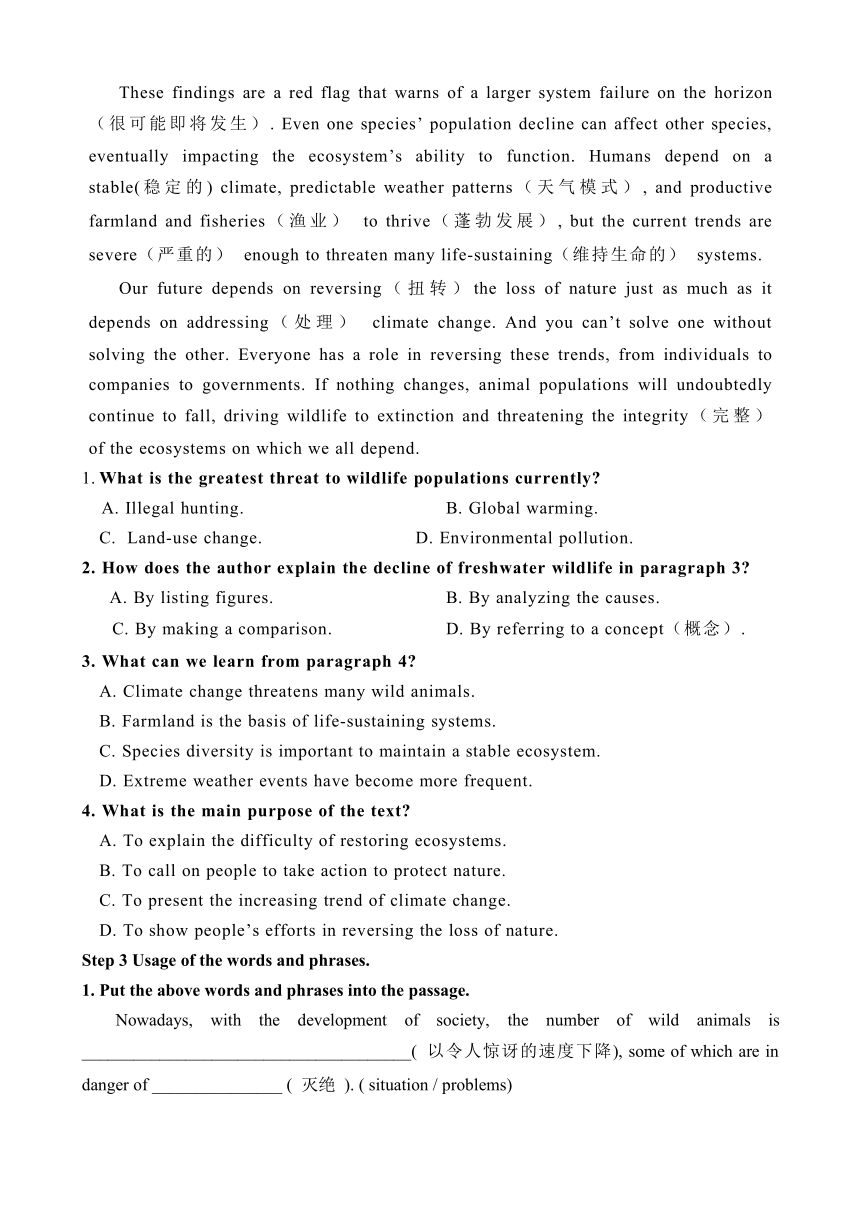人教版(2019)必修第二册Unit 2 Wildlife Protection词汇复习导学案(无答案)
文档属性
| 名称 | 人教版(2019)必修第二册Unit 2 Wildlife Protection词汇复习导学案(无答案) |

|
|
| 格式 | docx | ||
| 文件大小 | 223.8KB | ||
| 资源类型 | 教案 | ||
| 版本资源 | 人教版(2019) | ||
| 科目 | 英语 | ||
| 更新时间 | 2024-03-08 14:47:26 | ||
图片预览




文档简介
Book 2 Unit 2 Wildlife Protection 词汇复习导学案
词汇:
observe v. hunt v. / poach v. kill v. shoot v. destroy v. recover v. protect v. rescue v.
drop v. reduce v. decrease v. decline v.
increase v. preserve v. survive v. threaten v.
population n. pollution n. deforestation n. extinction n.
ivory n. bone n. fur n. skin n.
biodiversity n. ecosystem n. conservation n. breeding n.
extinct adj. effective adj. illegal adj. sustainable adj.
captive adj. stable adj.
词块:
natural environment the variety of its wildlife
destruction of habitat habitat loss
an endangered species list die out at an alarming rate
promote / raise people’s awareness of protecting the wildlife under threat
save this species from extinction become extinct
take measures/ actions to do sth. illegal hunting and killing
increase the number of... make people aware of the problem
keep ...safe from attack remove ... from...
under national protection National Nature Reserve
a shelter for... make profits
watch over exist / live in harmony with nature
a threat to ... speak up for endangered animals
call on sb. to do sth. endangered wildlife / species
set up / build more nature reserves keep the balance of nature
buy /chase the products made from wildlife human activities
pass laws to stop the hunting and killing express my concern over ...
deepen the understanding of ... cut down
spread this serious situation by using social media end up with / in ...
change the way of life set animal rescue center
Learning aims:
After this class, I hope you are able to:
Get familiar with the words and phrases about the topic wildlife protection.
Understand the reading comprehension about the topic wildlife protection.
Use the words and phrases to write passages about wildlife protection.
Enhance your awareness of the importance of protecting wildlife
Step 1 Sort out the words and phrases given to you according to the groups in the mind map.
Step 2 Reading comprehension.
The world’s animal populations have decreased by more than two-thirds since 1970, according to a recent research from the World Wildlife Fund (WWF).
The London group provided information on 32,000 wildlife populations which included more than 5,000 species. The researchers found that population sizes had declined by 69 percent on average. They said the loss of forests, human exploitation(开发)of the environment, pollution, and climate change were great causes of the loss. Land-use change is still the biggest threat to wildlife. However, the researchers added, “if we cannot limit warming to 1.5°C, climate change is likely to become the dominant(首要的) cause of biodiversity loss in the coming years.”
Wildlife populations in Latin America(拉丁美洲) and the Caribbean Sea area(加勒比海地区)were greatly affected. The research showed a 94 percent drop in those areas in over 50 years. Wildlife populations in river and lake habitats decreased the most. Freshwater populations have declined by an average of 83 percent since 1970. For example, one population of pink river dolphins in the Amazon River area of Brazil fell by 65 percent between 1994 and 2016.
These findings are a red flag that warns of a larger system failure on the horizon(很可能即将发生). Even one species’ population decline can affect other species, eventually impacting the ecosystem’s ability to function. Humans depend on a stable(稳定的) climate, predictable weather patterns(天气模式), and productive farmland and fisheries(渔业) to thrive(蓬勃发展), but the current trends are severe(严重的) enough to threaten many life-sustaining(维持生命的) systems.
Our future depends on reversing(扭转)the loss of nature just as much as it depends on addressing(处理) climate change. And you can’t solve one without solving the other. Everyone has a role in reversing these trends, from individuals to companies to governments. If nothing changes, animal populations will undoubtedly continue to fall, driving wildlife to extinction and threatening the integrity(完整) of the ecosystems on which we all depend.
What is the greatest threat to wildlife populations currently
A. Illegal hunting. B. Global warming.
Land-use change. D. Environmental pollution.
2. How does the author explain the decline of freshwater wildlife in paragraph 3
A. By listing figures. B. By analyzing the causes.
C. By making a comparison. D. By referring to a concept(概念).
3. What can we learn from paragraph 4
A. Climate change threatens many wild animals.
B. Farmland is the basis of life-sustaining systems.
C. Species diversity is important to maintain a stable ecosystem.
D. Extreme weather events have become more frequent.
4. What is the main purpose of the text
A. To explain the difficulty of restoring ecosystems.
B. To call on people to take action to protect nature.
C. To present the increasing trend of climate change.
D. To show people’s efforts in reversing the loss of nature.
Step 3 Usage of the words and phrases.
1. Put the above words and phrases into the passage.
Nowadays, with the development of society, the number of wild animals is ______________________________________( 以令人惊讶的速度下降), some of which are in danger of _______________ ( 灭绝 ). ( situation / problems)
There are many reasons for this. Firstly, some people are still hunting wild animals to ______________( 获利 ). In addition, the ____________( 栖息地 ) of wild animals are being destroyed by human beings. Finally, _______________________( 环境污染 ) also leads to the extinction of wild animals.(reasons) As for protecting wild animals, what we can do is to make laws to__________________( 停止捕杀) them and destroying their habitats. What’s more, _______________( 措施) should be taken to stop pollution. ( measures )
All in all, it is high time that we devoted ourselves to ______________________(保护野生动物). To protect wild animals is to protect ourselves. ( appealing )
2. Translate the following sentence with the words and phrases above.
(1) I am writing to express my concern over wildlife
(因为现在许多野生动物正在灭绝或濒临灭绝).
(2) People ________________________________( 捕杀野生动物获取利益) , because their fur can be made into clothes and _________________________( 他们的牙齿可以做成)handicraft.
(3) Some People think animals are fierce and can attack them. ______________________________
_______________________________________ (这就是他们不能和动物和谐相处的原因).
A nature reserve is _________________ ( 是动物的庇护所 ), so I suggest that _________________________________________________ (我们应该为野生动物们建立一些保护区), where they can be placed _______________________(在国家保护下).
(5) What’s the most important thing is _________________________________________________
( 提高人们对野生动物的保护意识)
(6)_____________________________________________________________________________
( 只有用这种方法, 我们才能拯救野生动物 ).
Step 4 Variation in compositions.
Composition 1 :
西伯利亚虎是全球十大最濒危稀有动物之一,现在WWF就如何保护西伯利亚虎向社会征求意见,现请你对西伯利亚虎的保护提出自己的建议,建议包括以下内容:
(1) 描述这类动物濒临灭绝的原因;
(2) 就如何保护他们提出自己的建议;
(3) 请WWF认真考虑建议。
注意:100词左右;可以适当增加细节, 以使文章连贯。
写作步骤:
1.审题:应用文体裁:
文章时态:
要点分布:
选用的句型:
2. 写作雏形:
Dear Sir / Madam,
________________________________________________________________________________________________________________________________________________________________________________________________________________________________________________________________________________________________________________________________________________________________________________________________________________________________________________________________________________________________________________________________________________________________________________________________________________________________________________________________
________________________________________________________________________________________________________________________________________________________________________________________________________________________________________________________________________________________________________________________________
________________________________________________________________________________________________________________________________________________________________________________________________________________________________________________________________________________________________________________________________________________________________________________________________________________________________________________________________________________________________
Yours faithfully,
Li Hua
找出写作中的3个亮点:
1:
2:
3:
找出写作中的2个不足:
1:
2:
你认为可以改进的1个方面:
此类话题还可以改变成其他体裁应用文,如:__________________________________________
Composition 2 :
3月3日世界野生动植物保护日,学校广播站征集关于野生动物保护的倡议书,假如你是李华,请结合以下信息,给我校广播站写一份倡议书,倡议大家关注野生动物的保护。
简述野生动物的现状;
野生动物减少的原因以及采取的措施;
呼吁大家保护野生动物。
注意: 字数控制在100词左右; 可以适当增加细节, 以使文章连贯。
Composition 3
3月3日世界野生动植物保护日,学校准备关于野生动物保护的话题开展一次英语演讲比赛,假如你是李华,请结合以下信息,写一份演讲稿参赛。演讲稿包含的要点如下:
简述野生动物的现状;
野生动物减少的原因以及采取的措施;
呼吁大家保护野生动物。
注意: 字数控制在100词左右; 可以适当增加细节, 以使文章连贯。
Composition 4 :
你非常关心濒临灭绝野生动物的处境。请你给WWF写一封信,就某一类你最关心的濒临灭绝的野生动物保护问题向他们寻求帮助。信件内容包括:
(1) 描述这类动物濒临灭绝的原因;
(2) 就如何保护他们提出自己的想法;
(3) 请WWF提供帮助。
注意:100词左右;可以适当增加细节, 以使文章连贯。
Step 4 Assessment
Step 5 Assignment
挑其中一种变式作文进行写作,并进行上文中的“3-2-1”分析。
找同学互评变式作文。
词汇:
observe v. hunt v. / poach v. kill v. shoot v. destroy v. recover v. protect v. rescue v.
drop v. reduce v. decrease v. decline v.
increase v. preserve v. survive v. threaten v.
population n. pollution n. deforestation n. extinction n.
ivory n. bone n. fur n. skin n.
biodiversity n. ecosystem n. conservation n. breeding n.
extinct adj. effective adj. illegal adj. sustainable adj.
captive adj. stable adj.
词块:
natural environment the variety of its wildlife
destruction of habitat habitat loss
an endangered species list die out at an alarming rate
promote / raise people’s awareness of protecting the wildlife under threat
save this species from extinction become extinct
take measures/ actions to do sth. illegal hunting and killing
increase the number of... make people aware of the problem
keep ...safe from attack remove ... from...
under national protection National Nature Reserve
a shelter for... make profits
watch over exist / live in harmony with nature
a threat to ... speak up for endangered animals
call on sb. to do sth. endangered wildlife / species
set up / build more nature reserves keep the balance of nature
buy /chase the products made from wildlife human activities
pass laws to stop the hunting and killing express my concern over ...
deepen the understanding of ... cut down
spread this serious situation by using social media end up with / in ...
change the way of life set animal rescue center
Learning aims:
After this class, I hope you are able to:
Get familiar with the words and phrases about the topic wildlife protection.
Understand the reading comprehension about the topic wildlife protection.
Use the words and phrases to write passages about wildlife protection.
Enhance your awareness of the importance of protecting wildlife
Step 1 Sort out the words and phrases given to you according to the groups in the mind map.
Step 2 Reading comprehension.
The world’s animal populations have decreased by more than two-thirds since 1970, according to a recent research from the World Wildlife Fund (WWF).
The London group provided information on 32,000 wildlife populations which included more than 5,000 species. The researchers found that population sizes had declined by 69 percent on average. They said the loss of forests, human exploitation(开发)of the environment, pollution, and climate change were great causes of the loss. Land-use change is still the biggest threat to wildlife. However, the researchers added, “if we cannot limit warming to 1.5°C, climate change is likely to become the dominant(首要的) cause of biodiversity loss in the coming years.”
Wildlife populations in Latin America(拉丁美洲) and the Caribbean Sea area(加勒比海地区)were greatly affected. The research showed a 94 percent drop in those areas in over 50 years. Wildlife populations in river and lake habitats decreased the most. Freshwater populations have declined by an average of 83 percent since 1970. For example, one population of pink river dolphins in the Amazon River area of Brazil fell by 65 percent between 1994 and 2016.
These findings are a red flag that warns of a larger system failure on the horizon(很可能即将发生). Even one species’ population decline can affect other species, eventually impacting the ecosystem’s ability to function. Humans depend on a stable(稳定的) climate, predictable weather patterns(天气模式), and productive farmland and fisheries(渔业) to thrive(蓬勃发展), but the current trends are severe(严重的) enough to threaten many life-sustaining(维持生命的) systems.
Our future depends on reversing(扭转)the loss of nature just as much as it depends on addressing(处理) climate change. And you can’t solve one without solving the other. Everyone has a role in reversing these trends, from individuals to companies to governments. If nothing changes, animal populations will undoubtedly continue to fall, driving wildlife to extinction and threatening the integrity(完整) of the ecosystems on which we all depend.
What is the greatest threat to wildlife populations currently
A. Illegal hunting. B. Global warming.
Land-use change. D. Environmental pollution.
2. How does the author explain the decline of freshwater wildlife in paragraph 3
A. By listing figures. B. By analyzing the causes.
C. By making a comparison. D. By referring to a concept(概念).
3. What can we learn from paragraph 4
A. Climate change threatens many wild animals.
B. Farmland is the basis of life-sustaining systems.
C. Species diversity is important to maintain a stable ecosystem.
D. Extreme weather events have become more frequent.
4. What is the main purpose of the text
A. To explain the difficulty of restoring ecosystems.
B. To call on people to take action to protect nature.
C. To present the increasing trend of climate change.
D. To show people’s efforts in reversing the loss of nature.
Step 3 Usage of the words and phrases.
1. Put the above words and phrases into the passage.
Nowadays, with the development of society, the number of wild animals is ______________________________________( 以令人惊讶的速度下降), some of which are in danger of _______________ ( 灭绝 ). ( situation / problems)
There are many reasons for this. Firstly, some people are still hunting wild animals to ______________( 获利 ). In addition, the ____________( 栖息地 ) of wild animals are being destroyed by human beings. Finally, _______________________( 环境污染 ) also leads to the extinction of wild animals.(reasons) As for protecting wild animals, what we can do is to make laws to__________________( 停止捕杀) them and destroying their habitats. What’s more, _______________( 措施) should be taken to stop pollution. ( measures )
All in all, it is high time that we devoted ourselves to ______________________(保护野生动物). To protect wild animals is to protect ourselves. ( appealing )
2. Translate the following sentence with the words and phrases above.
(1) I am writing to express my concern over wildlife
(因为现在许多野生动物正在灭绝或濒临灭绝).
(2) People ________________________________( 捕杀野生动物获取利益) , because their fur can be made into clothes and _________________________( 他们的牙齿可以做成)handicraft.
(3) Some People think animals are fierce and can attack them. ______________________________
_______________________________________ (这就是他们不能和动物和谐相处的原因).
A nature reserve is _________________ ( 是动物的庇护所 ), so I suggest that _________________________________________________ (我们应该为野生动物们建立一些保护区), where they can be placed _______________________(在国家保护下).
(5) What’s the most important thing is _________________________________________________
( 提高人们对野生动物的保护意识)
(6)_____________________________________________________________________________
( 只有用这种方法, 我们才能拯救野生动物 ).
Step 4 Variation in compositions.
Composition 1 :
西伯利亚虎是全球十大最濒危稀有动物之一,现在WWF就如何保护西伯利亚虎向社会征求意见,现请你对西伯利亚虎的保护提出自己的建议,建议包括以下内容:
(1) 描述这类动物濒临灭绝的原因;
(2) 就如何保护他们提出自己的建议;
(3) 请WWF认真考虑建议。
注意:100词左右;可以适当增加细节, 以使文章连贯。
写作步骤:
1.审题:应用文体裁:
文章时态:
要点分布:
选用的句型:
2. 写作雏形:
Dear Sir / Madam,
________________________________________________________________________________________________________________________________________________________________________________________________________________________________________________________________________________________________________________________________________________________________________________________________________________________________________________________________________________________________________________________________________________________________________________________________________________________________________________________________
________________________________________________________________________________________________________________________________________________________________________________________________________________________________________________________________________________________________________________________________
________________________________________________________________________________________________________________________________________________________________________________________________________________________________________________________________________________________________________________________________________________________________________________________________________________________________________________________________________________________________
Yours faithfully,
Li Hua
找出写作中的3个亮点:
1:
2:
3:
找出写作中的2个不足:
1:
2:
你认为可以改进的1个方面:
此类话题还可以改变成其他体裁应用文,如:__________________________________________
Composition 2 :
3月3日世界野生动植物保护日,学校广播站征集关于野生动物保护的倡议书,假如你是李华,请结合以下信息,给我校广播站写一份倡议书,倡议大家关注野生动物的保护。
简述野生动物的现状;
野生动物减少的原因以及采取的措施;
呼吁大家保护野生动物。
注意: 字数控制在100词左右; 可以适当增加细节, 以使文章连贯。
Composition 3
3月3日世界野生动植物保护日,学校准备关于野生动物保护的话题开展一次英语演讲比赛,假如你是李华,请结合以下信息,写一份演讲稿参赛。演讲稿包含的要点如下:
简述野生动物的现状;
野生动物减少的原因以及采取的措施;
呼吁大家保护野生动物。
注意: 字数控制在100词左右; 可以适当增加细节, 以使文章连贯。
Composition 4 :
你非常关心濒临灭绝野生动物的处境。请你给WWF写一封信,就某一类你最关心的濒临灭绝的野生动物保护问题向他们寻求帮助。信件内容包括:
(1) 描述这类动物濒临灭绝的原因;
(2) 就如何保护他们提出自己的想法;
(3) 请WWF提供帮助。
注意:100词左右;可以适当增加细节, 以使文章连贯。
Step 4 Assessment
Step 5 Assignment
挑其中一种变式作文进行写作,并进行上文中的“3-2-1”分析。
找同学互评变式作文。
